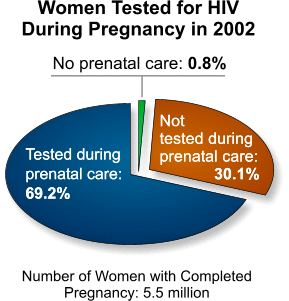Data & Statistics
Other Features
Featured Data & Statistics
HIV Testing During Pregnancy
HIV transmission from mother to child during pregnancy, labor, delivery, or breastfeeding is called perinatal transmission. Research published in 1994 showed that zidovudine (ZDV) given to pregnant HIV-infected women and their newborns reduced this type of HIV transmission.1 Since then, the testing of pregnant women and prophylactic treatment for those who are infected have resulted in a dramatic decline in the number of children perinatally infected with HIV.
Perinatal HIV transmission is the most common route of HIV infection in children and is now the source of almost all AIDS cases in children in the United States.2 Most of the children with AIDS are members of minority races/ethnicities.
Recent CDC studies found that HIV testing rates for pregnant women varied widely and that a relatively high proportion of women of child-bearing age were unaware that treatment is available to reduce the risk of perinatal transmission.3,4

However, in a study of HIV testing, 69% of the 748 women who had a completed pregnancy during the 12 months before participating in the 2002 National Survey of Family Growth reported that they had been tested during prenatal care. This percentage is consistent with the range of values found in a number of State and local studies, including follow-back surveys of recent mothers and chart review studies, and was applied to the 5.5 million pregnancies completed in the past year in the same 2002 study.5,6
According to 2004 data, HIV counseling and testing of pregnant women and the use of antiretroviral therapy during pregnancy have saved lives and resources.
- The number of children with a diagnosis of AIDS who had been perinatally exposed to HIV declined from 122 in 2000 to 47 in 2004.2
- Antiretroviral therapy administered during pregnancy, labor, and delivery and then to the newborn, as well as elective cesarean section for women with high viral loads (more than 1,000 copies/ml), can reduce the rate of perinatal HIV transmission to 2% or less.7 If medications are started during labor, decreased rate of perinatal transmission can still be achieved (less than 10%).
For more information, please see the following links:
Mother-to-Child (Perinatal) HIV Transmission and Prevention Fact Sheet
HIV Testing in the United States, 2002
One Test, Two Lives
1Connor EM, Sperling RS, Gelber R, et al. Reduction of maternal-infant transmission of human immunodeficiency virus type 1 with zidovudine treatment. New England Journal of Medicine 1994;331:1173–1180.
2CDC. HIV/AIDS Surveillance Report, 2004. Vol. 16. Atlanta: US Department of Health and Human Services, CDC; 2005:1-46.
3CDC. HIV testing among pregnant women―United States and Canada, 1998–2001. MMWR 2002;51:1013–1016.
4Anderson JE, Ebrahim S, Sansom S. Women’s knowledge about treatment to prevent mother-to-child human immunodeficiency virus transmission. Obstetrics and Gynecology 2004;103:165–168.
5Anderson JE, Chandra A, Mosher WD. HIV Testing in the United States, 2002. Hyattsville, MD: National Center for Health Statistics; 2005:1–32. Advance Data from Vital and Health Statistics, No. 363. Available from: http://www.cdc.gov/nchs/products/pubs/pubd/ad/361-370/ad363.htm.
6Gorsky RD, Farnham PG, Straus WL. Preventing perinatal transmission of HIV―costs and effectiveness of a recommended intervention. Public Health Reports 1996;111:335–341.
7CDC. Revised recommendations for HIV screening of pregnant women. MMWR 2001;50(No. RR-19):59–85.
Page last modified: June 27, 2007
